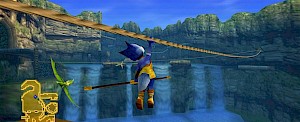News: Yamauchi comments on Iwata
Posted 10 Jun 2002 at 08:48 by Gerben
Satoru Iwata, Nintendo Co. director in charge of game development, remembers the day he was summoned to the office of Hiroshi Yamauchi, who headed the video- game maker for more than 50 years.
For two hours, the 74-year-old Yamauchi lectured Iwata on the challenges he overcame to transform Nintendo into the world's second-largest video-game maker from a producer of Japanese playing cards. The reason for the speech, Iwata later discovered: Iwata was about to be named president.
Now, Iwata must fulfill a vision that means forsaking a slugfest with Sony Corp. and Microsoft Corp. on video-game consoles. Nintendo lost its leadership of the $20 billion video- game industry to Sony in the 1990's and its GameCube risks being eclipsed by Microsoft in the No. 2 slot.
'No matter how many consoles Sony sells, and whatever Microsoft does, it is important for us to make our game software attractive enough to drive consumers to buy our hardware,' Iwata said in a press conference.
Iwata's appointment comes at a critical time for the video- game industry. U.S. spending on video games eclipsed movie box office receipts by $1 billion last year, the second year such spending outstripped movie takings. Nintendo's shares, meanwhile, have tumbled, falling by more than a quarter since Jan. 1 while rival Sony rose 15 percent.
Driving growth is a new generation of consoles developed by Sony and Microsoft that boast Internet connections, speedy graphics chips, DVD players and hard-disk drives. They resemble personal computers more than toys.
Yamauchi, whose 10 percent stake makes him the company's single biggest shareholder, concedes that the new consoles are a hit with game players and have helped the industry. Yet he insists that the challenge is for Nintendo to stay focused on developing games.
'Iwata is the right guy for the job because he is acquainted with both game software and hardware,'' Yamauchi said in a press conference. ''The game business is unique. Software should come first and hardware second, but some people seem to see it the other way around.'
Iwata has had plenty of time to learn Yamauchi's style in the two decades since he first began working at HAL Laboratories Inc., a Nintendo unit created in 1980 to make games for the gamemaker's consoles.
He came steeped in the tradition of computer programming. As a high school student, he developed simple number games using an electronic calculator, which he would then let his friends play, the bespectacled Iwata said in an interview last week.
Iwata worked as a part-time games programmer before joining HAL Laboratories full-time in 1982.
'My father didn't talk to me for about six months after I joined HAL,' Iwata said. 'They must have thought I was joining a religious cult.'
Recently, there have been signs that Yamauchi's grip may be softening. In March, Nintendo tied up with other software developers for the first time -- Sega Corp. and Namco Ltd. -- to make new games for GameCube.
That same months, Nintendo allowed Square Co., the maker of its best-sellng 'Final Fantasy' series of games to make software for the company. Square fell out of favor with Nintendo in 1996 after its decision to supply its ''Final Fantasy'' games exclusively for Sony's PlayStation machines.
In another sign Nintendo may be breaking from Yamauchi's hold, the company last month outlined plans to link its GameCube to the Internet.
Though Iwata described the moves as joint decisions made by Yamauchi and Nintendo's new management, some investors said they indicate a degree of independence.
'They may be an indication that Nintendo under a new president will be a little more open to the outside and less conservative,' said Michael King, a fund manager at Chicago, Illinois-based Liberty Wanger Asset Management.
Yamauchi's success in video games -- Nintendo dominated the industry in the 1990s -- didn't come overnight. After Yamauchi succeeded his father as president in 1949, the company was almost forced to file for bankruptcy in the late 1960s after several failed attempts to expand its product lineup into toy guns, baby carriages and even to fast food, according to several books written on Nintendo's history.
Chastened by the experience, Yamauchi vowed then not to borrow money to fund Nintendo's operations.
'Even if we need 500 billion ($4 billion) or 1 trillion yen, I never, ever want to bow my head to someone to ask for money, and that is the very message I want to bestow on the new management,' Yamauchi said last week.
Yamauchi has made good on that pledge. Nintendo held almost 900 billion yen in cash and deposits at the end of March, 30 percent larger than Sony's holdings.
Iwata must now guide Nintendo through what Miyamoto has called a 'make-or-break year.'
Source: Bloomberg






















